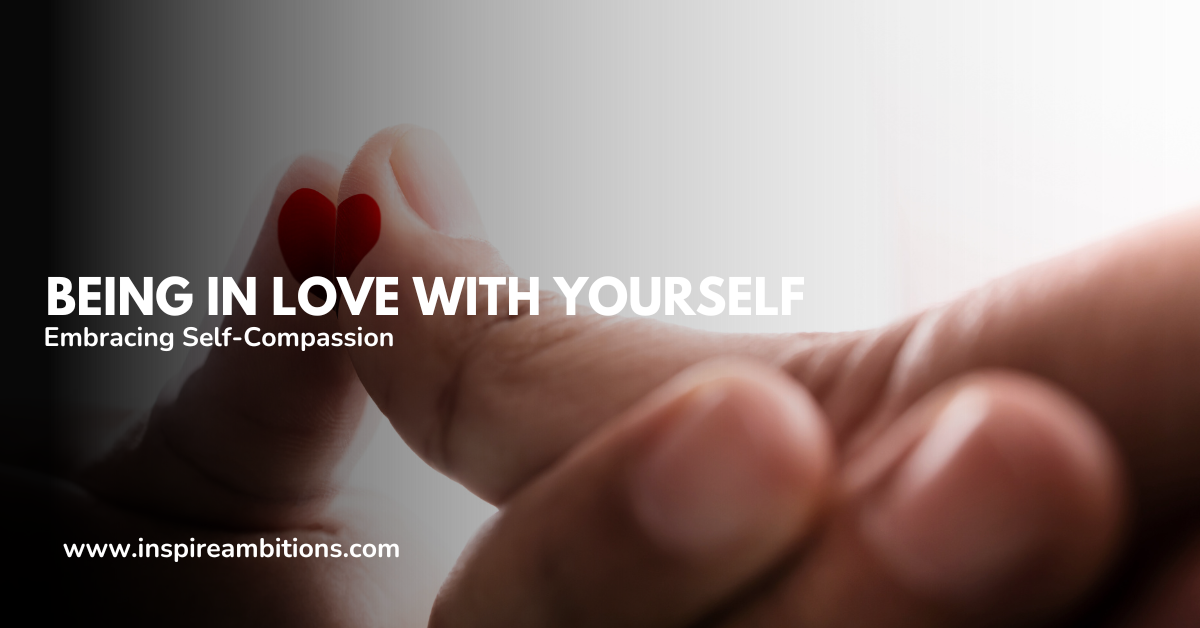自分自身を愛すること – セルフコンパッションと自信を受け入れる
自分を愛することは、充実した人生と健全な人間関係の基礎です。自己愛とは、自分に夢中になったりナルシストになることではないことを理解することが重要です。代わりに、自分の価値を認識し、ニーズに応えることが重要です。
自己愛を受け入れることは、同じ考えを持つ人々を引き寄せる自信と喜びにつながるため、自分自身の人生だけでなく、あなたの周りの人々の人生も変えることができます。
自己愛は練習であり、目的地ではありません。これは継続的な旅であり、反省、自己慈悲、そして自分の幸福への取り組みが必要です。自分自身を愛することを学ぶと、自然にその愛がにじみ出て、自分と他の人の生活の質が向上します。
自己愛と自己慈悲に焦点を当てることで、精神的および感情的な幸福の強固な基盤を構築することができ、人生の課題を優雅さと回復力で乗り越えることができるようになります。
この記事では、自分を愛することのメリットと、自己愛を育むための実践的な方法を紹介します。
自己理解と受容に向けたこの旅に乗り出すとき、あなたは他の人に喜んで提供する愛、賞賛、そして配慮を受けるに値するということを忘れないでください。自己愛を実践することで、心の深い平安と充実感を育むことができ、自分の人生を最大限に生きることができるようになります。
自己愛を理解する
自己愛は個人の幸福にとって重要な側面であり、自分自身を完全に受け入れ、優しさと敬意を持って自分を扱い、自分の成長を育むことが必要です。自己愛を育むことは、人間関係、感情、精神的健康など、人生のさまざまな側面に良い影響を与えることができます。
自己愛を理解するには、その 4 つの主要な要素である自己認識、自尊心、自尊心、セルフケアを考慮してください。これらの要素 バランスの取れたものを作るために協力する 自己評価の感覚。真の自己愛を体験することは、自己愛なしではさらに難しくなります。
自己認識を養うことで、自分の考え、感情、行動を意識できるようになり、自分の感情をより深く理解できるようになります。
自分の価値を認識することは、自己愛のもう 1 つの重要な側面です。それには、個人としての自分の価値を認め、自分のユニークな資質を受け入れ、自分自身と他人の両方からの尊敬と優しさに値することを知ることが含まれます。
あなたの自尊心は、自尊心を構築するための重要な基盤であり、自信とさまざまな状況での自分自身の認識に関係します。
さらに、セルフケアは自己愛の重要な要素です。自分の身体的、精神的、感情的な健康を優先することで、自分自身への愛と感謝の気持ちを示すことができます。
セルフケアの実践には、運動、適切な睡眠、バランスの取れた食事、必要に応じて精神的なサポートを求めることが含まれます。忙しいスケジュールから時間を割くことは、自分自身に栄養を与え、強い自己愛の感覚を育むために不可欠です。
自己愛を育むのは難しいように思えるかもしれませんが、それは忍耐、献身、努力が必要な継続的な旅であることを忘れないでください。これらの側面に焦点を当て、定期的に自己慈悲を実践することで、自己愛が成長し繁栄できる環境が生まれます。
自己愛の重要性
自己愛は人生において重要な役割を果たし、あなたの人生に影響を与えます。 自尊心, 自信、 そして 自尊心。自己愛を受け入れるとは、自分自身を完全に受け入れ、優しさと敬意を持って自分を扱い、自分の成長と幸福を育むことを意味します。
セルフコンパッションを実践すると、健康、人間関係、モチベーション、自己実現、回復力、感情的なバランスをより良く維持できます。さらに、これらの特質は精神的健康と幸福にプラスに寄与し、憂鬱や不安の感情を寄せ付けません。
自己愛を深く掘り下げると、それが自分自身の扱い方を超えていることがわかるでしょう。それは、思いやり、好奇心、忍耐、そして寛容によって特徴付けられる内なる関係を育むことです。このアプローチは、自分の行動に対する説明責任や責任を否定するものではありません。むしろ、内省と成長を促します。
自己愛を育むことは、多くの場合、「私は誰かにとって重要である」という強い感覚、または誰かの世界で自分が重要であるという感覚につながります。自分自身への無条件の愛は自己受容を促進し、困難に立ち向かい、自信を持って障害を克服する力を与えます。
自己愛の基盤を築くには、次の実践を検討してください。
- ポジティブな自己イメージを作成します。 ネガティブな考えにこだわるのではなく、自分の強みや成果に焦点を当てましょう。
- 健全な境界線を設定します。 ノーと言い、自分の幸福と自尊心を守るための制限を設けることを学びましょう。
- セルフコンパッションを実践しましょう: 愛する人や友人に与えるのと同じ優しさと理解をもって自分自身を扱いましょう。
- 自分を許して: 自分を責めたり批判したりせずに、自分の不完全さを受け入れ、そこから学びましょう。
自己愛を日常生活に組み込むと、さまざまな方法で人生を向上させることができます。自分のニーズを優先し、自分への思いやりを受け入れることで、自信、自尊心、自尊心が高まり、個人の成長と充実のための新たな機会が開かれます。
否定的な感情の認識と対処
怒り、恥、否定的な感情は人生において自然なことです。これらの感情を認識し、それらに健全に対処することは、自己愛と個人の成長にとって不可欠です。ネガティブな感情に効果的に対処するのに役立ついくつかの手順を次に示します。
1. 自分の感情を特定します。
いつでも自分が経験している感情に注意してください。感情を抑えたり避けたりせずに、自分の感情を認めてください。
2. トリガーについて考察します。
何がこれらの否定的な考えや感情を引き起こしたのか考えてみましょう。特定の出来事や根底にある恐怖など、これらの感情の背後にある原因を掘り下げてください。
3. セルフコンパッション:
時々否定的な感情を経験するのは正常なことであることを忘れずに、自分自身に親切に接してください。自分は人間であり、挫折は成長の機会であることを認識して、セルフコンパッションを実践しましょう。
4. 健全な対処戦略を使用します。
薬物乱用や過食など、感情に対処する有害な方法に頼るのではなく、より健康的なはけ口を見つけてください。これには、瞑想、日記を書く、趣味に取り組む、または自分の感情について友人に話すなどが含まれます。
5. ポジティブな習慣を実践する:
定期的な身体活動、適切な栄養、十分な睡眠を日常生活に組み込むことで、よりポジティブな考え方を身につけるように自分自身を励ましましょう。これらの習慣を実践すると、感情の制御が向上し、全体的な幸福が促進されます。
6. 必要に応じて、専門家の助けを求めてください。
ネガティブな感情を自分で管理することが難しい場合は、ためらわずにセラピーやカウンセリングなどの専門家の助けを求めてください。
と認識することで、 ネガティブな感情を管理する、あなたは自己愛を育み、より健康で回復力のある考え方を生み出すための一歩を踏み出しています。自分自身に優しくすることを忘れずに、個人的な成長の旅を受け入れてください。
メンタルヘルスと自己愛
自己愛を実践すると、精神的健康に大きな影響を与える可能性があります。自分の感情と調和し、自尊心を受け入れ、セルフケアを養うことで、全体的な幸福度が向上し、困難に直面しても回復力を保つことができます。
自己愛は、自分自身を完全に受け入れ、自分の強みに集中できるため、うつ病、不安、ストレスの感情を軽減します。自分の欠点や限界にこだわるのではなく、自分のユニークな特質を理解し始め、それが積極性と自信を育みます。
セルフケア活動に参加すると、メンタルヘルスをより効果的に管理できます。これらには、定期的な運動、健康的な食生活の維持、十分な睡眠、リラックスや趣味のための時間を見つけることが含まれる場合があります。身体の健康に気を配ることは、精神的な健康のための強力な基盤を作ります。
さらに、他の人たちとつながることでサポート体制を構築することもできます。 自己愛を実践する そして自分自身への思いやり。ポジティブな影響に囲まれることで、メンタルヘルスの改善に向けた旅を続けることができます。経験を共有し、お互いから学ぶことで、人生のストレス要因に対処する能力が高まります。
セラピーに関しては、自分自身を愛することで、セラピストとの経験が強化されます。強い自己愛と自己慈悲の意識は、指導や建設的なフィードバックを受け入れるための感情的なツールと自己認識を備えます。
その結果、セラピーセッションはあなたの人生により永続的で変革的な影響を与えることができます。
結論として、自己愛を育むことは精神的健康を維持し、改善するために不可欠です。自分自身を受け入れて優しくすることで、ストレスや不安、うつ病に至るまで、多くの心理的課題を克服できます。セラピストやメンタルヘルスの専門家からのサポートを求めることは、自己愛とより健康的な考え方にとって不可欠であることを忘れないでください。
セルフケア戦略
セルフケアを実践することは、自己愛を育み、全体的な健康を維持するために不可欠です。以下のセルフケア活動を日常生活に組み込むと、自分自身とより前向きな関係を築き、精神的および身体的健康を高めることができます。
瞑想:
毎日数分かけて心を静めると、ストレスが軽減され、自己認識が高まります。快適な場所を見つけて、目を閉じて呼吸に集中してください。そうすることで、自分の内なる自分とつながり、平和と静けさの感覚を促進できるようになります。
エクササイズ:
定期的に身体活動を行うことは、身体の健康だけでなく、精神的な健康にも有益です。運動すると、気分や自尊心を高めるエンドルフィンが放出されます。ウォーキング、水泳、ダンスなど、自分が楽しめるアクティビティを取り入れて、その経験をより楽しく持続可能なものにするようにしましょう。
健康な食生活:
さまざまな果物、野菜、全粒穀物、脂肪分の少ないタンパク質、健康的な脂肪を毎日の食事に取り入れて、栄養価の高い食品で体にエネルギーを与えましょう。よく食べることは身体的健康を改善し、ポジティブな自己イメージとエネルギーレベルの向上に貢献します。
ジャーナリング:
自分の考えや感情を紙に書き出すことは、自己表現や内省のための治療の手段となります。毎日時間をとって、自分の経験、感情、課題について書きましょう。ジャーナリングは、自分の感情を処理して理解するための効果的なツールとなり、最終的には自分自身とのより深いつながりを育みます。
これらのセルフケア戦略を日常生活に組み込むと、自己愛と幸福の強力な基盤が培われます。一貫性が重要であることを忘れないでください。そのため、ニーズに優先順位を付けるよう意識的に努力し、これらのアクティビティに定期的に参加して、最も大きなメリットを実感してください。
自己愛の境界線を設定する
個人的な境界線を確立することは、自己愛と自尊心の重要な側面です。エッジは、自分自身や他者との健全な関係を維持し、精神的、感情的、肉体的な健康を確保するのに役立ちます。自分の限界を認識し、 それらを効果的に伝える あなたの周りの人たちへの影響は不可欠です。
境界線を設定し始めるには、人間関係や私生活で何が必要で何が欲しいかを正直に考えてください。不快に感じたり、軽視されたり、圧倒されたりした過去の経験を振り返ってください。これらの状況を特定すると、どこに線を引くべきかを理解するのに役立ちます。
境界線を確立するということは、他人との境界線を設定し、自分自身との境界線を作ることです。セルフケアの時間を設定したり、運動をしたり、画面を見る時間を制限したりするなど、自己規律を実践することは、身体的、精神的、感情的な健康にプラスの影響を及ぼします。
セルフトークを肯定する、健康的な食事、前向きな友人関係を維持するなど、自分自身に満足できる活動に取り組み、自分の健康を優先しましょう。
自分の境界線を伝えることは、他の人が境界線を尊重するために不可欠です。自分の限界を明確かつ積極的に表現し、他の人の限界にも注意深く耳を傾けてください。境界線を設けるのは利己的ではないことを認識してください。それはセルフケアの不可欠な形式です。
特に自分自身を主張することに慣れていない場合、境界線を設定するのは難しいかもしれないことに注意してください。しかし、練習と粘り強さによって、自己愛に必要な自信と自尊心を養うことができます。成長し学習するにつれて、自分の境界線を再評価して調整することを恐れないでください。自分のニーズと調和することで、自分自身との関係が強化されます。
健全な人間関係を築く
健全な人間関係を築くには、まず自己愛と自己受容の強固な基盤を確立することが不可欠です。自分自身を愛し受け入れることを学ぶことで、他者との前向きで育む関係の発展を促す環境を作り出すことができます。
この自己愛の感覚を育むために、自分自身について良い気分になれる活動に参加してください。これらには、定期的な運動、バランスの取れた食事、趣味や興味のあることに取り組むこと、協力的な友人や家族と時間を過ごすことが含まれます。
セルフコンパッションを実践し、間違いを犯したときに自分に優しくし、内なる批判者を静めることも、自分自身と健全な関係を築く上で重要な側面です。
強い自己関係を構築したら、他者との健全な関係を確立し維持することに集中できます。健全な関係は、オープンなコミュニケーション、信頼、相互尊重、そして強い共感感によって特徴付けられます。
恋愛関係では、自分のアイデンティティと独立性の感覚を維持することが不可欠です。パートナーに精神的なサポートを求めすぎないようにして、パートナーにも同じようにサポートしてもらうように勧めてください。成功する恋愛関係は、独立性を保ちながらお互いをサポートし、高め合う 2 人の個人で構成されることを忘れないでください。
健全な関係を育むときは、次のヒントを考慮してください。
- オープンかつ正直にコミュニケーションします。 自分の考え、感情、懸念事項を敬意を持ってパートナーや友人と共有し、彼らにも同じようにするよう勧めてください。
- 共感を実践する: パートナーの感情や経験を理解し、彼らの立場に立って考えてみましょう。これは、相手の視点をよりよく理解し、関係内の感情的なつながりを強化するのに役立ちます。
- 境界を設定します。 自分の健康を守り、ニーズを満たすために、明確な境界線を確立します。これらの境界をパートナーに伝え、パートナーの境界も尊重してください。
- 感謝の意を示す: あなたの人生におけるパートナーや友人の存在と、彼らが関係に貢献してくれたことに定期的に感謝の意を表しましょう。これにより、あなたの間の絆が強化され、お互いへのコミットメントが強化されます。
- 競合を丁重に解決します。 意見の相違はどのような関係においても自然なことです。ただし、理解と敬意を持って対応することで、紛争を解決し、緊張の高まりを防ぐことができます。
自己愛を実践し、これらのガイドラインを遵守することで、ロマンチックでプラトニックな健全な関係が成長し、繁栄できる環境を作り出すことができます。
自己愛を高めるためのツール
自己愛を育むことは、全体的な幸福と精神的健康にとって不可欠です。自分を内側から外側からケアすることで、自信が高まり、より幸せで充実した人生を送ることができます。ここでは、自己愛の旅を強化するのに役立つツールをいくつか紹介します。
1. メンタルヘルスをサポートするアプリを使用する
Numerous apps can teach you about self-care and guide you through exercises to improve self-love. Choose an app with features such as mindfulness techniques, affirmations, and 誘導瞑想 あなたの自尊心と自分への思いやりを高めるのに役立ちます。
2. 日記をつける
日記は個人の成長のための強力なツールであり、自分の考え、感情、経験を振り返るのに役立ちます。毎日時間を割いて、自分の成功、課題、その他自尊心に影響を与える可能性のあることについて書きましょう。さらに、自己愛と受容を促進するポジティブな肯定を日記に記録してください。
3. 気分を高揚させる音楽をライフスタイルに取り入れる
音楽はあなたの感情に大きな影響を与えることができます。自己愛を刺激し、自分に対するポジティブな感情を促す曲を集めたプレイリストを作成します。毎日の通勤中、トレーニング中、または単にリラックスした瞬間を楽しんでいるときなど、元気づけが必要なときにいつでもこれらのトラックを聴いてください。
4. 自然とつながる
自然の中で屋外で時間を過ごすと、精神的な健康が改善され、人生の単純なことを大切にすることができます。
公園、森林、海辺を散歩して、周囲の美しさを満喫することを優先しましょう。自然界とのこのつながりは、グラウンディングの感覚を与え、自己愛の旅を強化します。
上記のツールはほんの始まりにすぎないことを忘れないでください。あなたには、自己愛を育み、より充実した人生を送る力があなたの中にあります。これらのテクニックを一貫して実践することで、全体的な幸福感と幸福感が改善されるのがわかります。
挫折と課題に対処する
挫折や挑戦を経験することは人生の自然な部分です。困難に直面したときは、健全に対処し、回復力を高める方法を見つけることが不可欠です。挫折や課題に対処することで、自分自身を愛し、気遣う能力が高まります。
変化を成長の機会として受け入れましょう。新しい状況に適応するのは不快な場合もありますが、変化は次のような事態を引き起こす可能性があります。 自己啓発。変化は避けられないことを認識し、自分がコントロールできることに集中することで、困難な時期に自分の感情や反応をコントロールできるようになります。
It’s crucial to build resilience, which is adapting to difficult situations. When stress, adversity, or trauma strikes, allow yourself to experience emotions like anger, grief, and pain. While these emotions can be overwhelming, they help you process events and maintain your psychological well-being. Remember that resilience is not just about tolerating hardships but learning to cope in healthier ways.
In the face of setbacks, allow yourself to grieve. Mourning the loss or disappointment helps you process it more effectively, leading to healing and growth. Acknowledging grief is a part of building resilience and staying in touch with your emotions.
Don’t be afraid to seek help or support when needed. Contact friends, family, or professionals who can offer guidance or a listening ear. Surrounding yourself with a supportive network can significantly improve your ability to handle setbacks and challenges.
Lastly, practise self-compassion and establish a self-care routine. Treat yourself with kindness, forgive yourself for mistakes or perceived shortcomings, and give yourself space to heal and grow. A regular self-care routine can include activities that promote relaxation and mindfulness, such as journaling, meditation, or exercise.
By approaching setbacks and challenges with these strategies, you’ll develop resilience and strengthen your connection with yourself. Loving yourself is a continuous journey, and embracing the opportunity to grow from difficult situations will enhance your self-acceptance and well-being.
個人の成長に向けてモチベーションを維持する
Embarking on the journey towards personal growth is essential to embracing self-love. You foster a deeper connection with yourself by acknowledging your strengths, talents, and potential. This section will explore ways to stay motivated towards personal growth.
成長マインドセットを養う:
Embrace the belief that your talents and abilities can be developed through dedication and continuous learning. Set your mind on progress rather than perfection. It is a gradual journey, and every step you take contributes to your overall development.
自分の強みを特定し、そこに焦点を当てます。
Recognise the areas where you excel and dedicate time to further strengthening these abilities. Leverage your strengths as building blocks for achieving your goals.
現実的な目標を設定します。
Establish achievable and measurable objectives. Ensure your goals align with your passions, interests, and values. By doing this, you build a solid foundation for your personal growth.
ルーチンを確立します。
Develop daily routines that promote growth and well-being. Consistency is critical to maintaining motivation. Incorporate activities such as exercise, meditation, and creative pursuits that feed your mind, body, and soul.
マイルストーンと進歩を祝います:
Acknowledge your achievements, big or small, and use them as motivation to keep moving forward. Reward yourself for your progress, and be kind to yourself during setbacks.
他の人からインスピレーションとサポートを求めてください。
Surround yourself with people who inspire you to grow and motivate you to achieve your goals. Engage in conversations and activities that challenge and support your growth.
好奇心を持ち、学ぶことにオープンであり続けてください。
Embrace new experiences and opportunities as a chance to expand your knowledge and skills. Continuously seek ways to learn and grow in all aspects of your life.
By incorporating these strategies into your daily life, you nurture a loving relationship with yourself and stay motivated to grow. Achieving personal growth is ongoing, and maintaining momentum is crucial in embracing self-love and self-compassion.
セルフコンパッションと優しさの役割
When cultivating a healthier and more positive relationship with yourself, self-compassion and kindness play a crucial role. In short, self-compassion is about being kind and understanding when confronted with personal failings, while kindness involves treating oneself gently and with care.
As you begin to appreciate yourself for who you are, it is essential to be kind to yourself. This means recognising and accepting your strengths and achievements and forgiving yourself for your mistakes and shortcomings.
By practising self-forgiveness, you let go of negative self-blame and judgements that hold you back from growth and happiness.
Self-forgiveness involves understanding that you, like everyone else, are not perfect. Accepting that we all have faults and are bound to make mistakes allows you to treat yourself kindly. Remember, it’s crucial to use your failures as opportunities to learn and move forward instead of dwelling on them.
Mindfulness plays an essential role in developing self-compassion. Awareness of your thoughts and emotions helps you understand when you’re being unkind to yourself. This awareness allows you to acknowledge your feelings, make space for them, and start the process of self-forgiveness.
Practicing self-compassion and kindness also includes setting realistic expectations for yourself. Overly demanding goals and aspirations can lead to disappointment and further self-criticism. Aim for small, achievable victories, and don’t forget to celebrate those wins along the way.
Moreover, self-compassion can lead to various benefits, including lower levels of anxiety and depression, better overall well-being, and improved relationships with those around you.
By being kind to yourself, you also learn how to extend kindness and compassion to others, ultimately cultivating a more favourable environment for everyone involved.
In conclusion, make a conscious effort to practice self-compassion and kindness daily.
Whether engaging in self-care, setting attainable goals, or developing a self-forgiveness ritual, these practices will help you foster a more loving and benevolent relationship with yourself. Remember, you deserve kindness and compassion – from others and, most importantly, from yourself.
比較を克服し、不完全さを受け入れる
It’s natural to compare yourself to others, but it can harm your self-esteem and self-love journey. To overcome this habit, focus on your unique qualities instead of constantly comparing yourself to others. Recognise that everyone has strengths and weaknesses, and your imperfections make you just as human as anyone else.
Instead of focusing on your flaws, practice gratitude for your abilities and accomplishments. Cultivate a sense of appreciation for the person you are, knowing that aspects of your life are uniquely yours. Additionally, surround yourself with positive, supportive people who see your worth and encourage your growth.
During moments of self-criticism, try to be more compassionate with yourself. Understand that nobody is perfect, and it is through our imperfections that we grow and learn. When you criticise your actions or appearance, step back and challenge those thoughts.
Ask yourself if you would speak to a friend in such a manner and if not, extend the same kindness to yourself.
One effective way to accept your imperfections is by practising self-awareness. Identify your strengths and areas for improvement, and develop an action plan to work on them. You demonstrate acceptance and a willingness to grow by acknowledging your weaknesses and consciously improving.
Remember regularly that your imperfections do not define your worth; what truly matters is how you deal with them. Embrace your unique journey, and remember that you have the power to change and improve as a person. The more you practice this attitude, the more confident and secure in your skin you will be.
In conclusion, a vital component of self-love is overcoming comparison and embracing your imperfections. By cultivating gratitude, self-compassion and a growth mindset, you enable yourself to fully accept the person you are and enjoy a life of greater self-love.
自己愛のためのリソースを活用する
Utilising various resources such as articles, reading materials from reputable sources like the American Psychological Association, and observing specific behaviours can significantly enhance your self-love journey.
These tools help you understand how to cultivate self-appreciation and improve your overall well-being.
Firstly, seeking 記事 on self-love from trusted sources such as Psychology Today and Psych Central can provide valuable tips and insights. These publications often feature research-based advice and real-life examples that can inspire you to cultivate self-kindness and self-compassion in your day-to-day life.
Furthermore, engaging in 読む materials such as books, journals, and blog posts from reputable authors or researchers in psychology can provide an extensive understanding of approaches to self-love.
These resources often delve into topics like personal boundaries, self-care, and affirmation techniques, all essential to building a healthy relationship with oneself.
Another crucial aspect to consider is the American Psychological Association (APA), a leading source of information on mental health and psychological well-being. The APA offers a wealth of resources such as articles, research papers, and educational materials aimed at helping individuals foster personal growth and self-compassion.
Finally, observing and understanding the behaviours that contribute to self-love is essential. For instance, practising self-awareness, focusing on personal strengths, and setting realistic expectations can positively impact your self-perception. Creating a supportive environment and connecting with like-minded individuals who value self-care and self-love can reinforce positive behaviour patterns.
In summary, leveraging readily available resources such as articles, reading materials, and authoritative organisations and understanding key behaviours can remarkably benefit your journey towards loving yourself more.
Exploring and utilising these resources can significantly improve your emotional well-being and happiness.
興味や情熱を育む
Taking the time to nurture your interests and passions is essential to self-love and personal development. By actively engaging in activities you enjoy, you demonstrate care for your well-being and foster a sense of self-discovery and confidence.
Giving yourself the space and time to explore your passions is crucial. Schedule dedicated time during the week to engage in hobbies or activities that excite and inspire you. This prioritisation of personal pursuits can lead to a sense of accomplishment and enhance your overall satisfaction with life.
As you delve into your interests, you’ll likely encounter challenges, which is typical and expected. Approaching these obstacles with a resilient mindset and a willingness to learn will strengthen your abilities and reinforce your dedication to personal growth. Stay persistent, and remember to celebrate your progress, no matter how small it may seem.
In addition to individual pursuits, consider joining clubs or groups that align with your interests. This allows you to expand your skill set and knowledge and offers the opportunity to build a supportive network of like-minded individuals.
Engaging in these communities can lead to lasting connections and foster a sense of belonging, further enriching your self-love journey.
Remember, nurturing your interests and passions should be an enjoyable and fulfilling process. Remain open to new experiences, embrace challenges, and relish the knowledge you gain. Doing so will cultivate an unwavering love for yourself and allow you to live a life that genuinely reflects your values and desires.
自分自身を愛すること – 結論
Embracing self-love is a journey of self-discovery that encourages you to appreciate your worth and uniqueness. As you explore the depths of your identity, you’ll realise the importance of valuing and accepting yourself, flaws and all.
By cultivating self-love, you can develop a confident, knowledgeable, and neutral perspective of your life, empowering you to make better decisions and maintain healthier relationships.
To nurture self-love, start by being kind to yourself in your thoughts and actions. Replace negative self-talk with positive affirmations, and set aside time for self-care routines that promote physical, mental, and emotional well-being.
Remember, respecting your needs and setting boundaries that promote a balanced lifestyle is essential.
Lastly, take the time to appreciate your strengths and achievements genuinely. Acknowledge the progress you’ve made in your self-love journey and continue to explore new ways to understand and celebrate your true self. By proactively embracing self-love, you’re creating a solid foundation for a fulfilling and happy life.







